Newsletter # 47

Animal models
-
Click on the drug name to see an example of its procognitive effect :
-
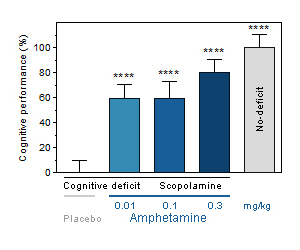
Amphetamine
Reversal effect of Amphetamine on cognitive deficit induced by scopolamine in the mouse. Cognitive function was assessed by the ability of mice to perform spontaneous, continuous and sustained alternation in the T-maze.
-
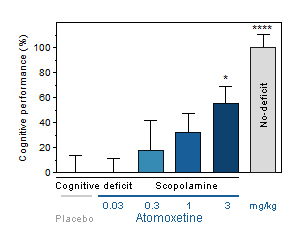
Atomoxetine
Reversal effect of Atomoxetine on cognitive deficit induced by scopolamine in the mouse. Cognitive function was assessed by the ability of mice to perform spontaneous, continuous and sustained alternation in the T-maze.
-
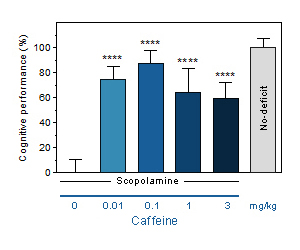
Caffeine
Reversal effect of Caffeine on cognitive deficit induced by scopolamine in the mouse. Cognitive function was assessed by the ability of mice to perform spontaneous, continuous and sustained alternation in the T-maze.
-
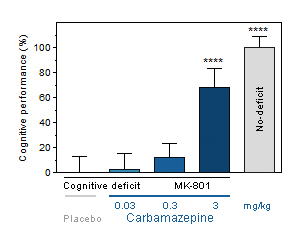
Carbamazepine
Reversal effect of Carbamazepine on cognitive deficit induced by MK-801 in the mouse. Cognitive function was assessed by the ability of mice to perform spontaneous, continuous and sustained alternation in the T-maze.
-
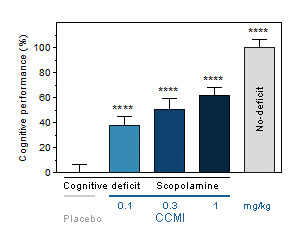
CCMI
Reversal effect of CCMI on cognitive deficit induced by scopolamine in the mouse. Cognitive function was assessed by the ability of mice to perform spontaneous, continuous and sustained alternation in the T-maze.
-
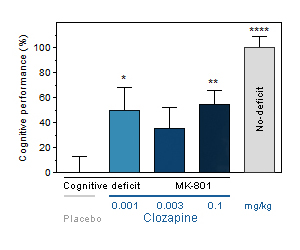
Clozapine
Reversal effect of Clozapine on cognitive deficit induced by MK-801 in the mouse. Cognitive function was assessed by the ability of mice to perform spontaneous, continuous and sustained alternation in the T-maze..
-
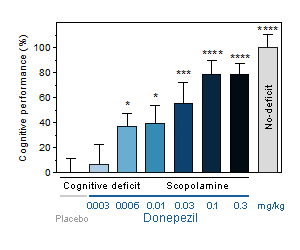
Donepezil
Reversal effect of Donepezil on cognitive deficit induced by scopolamine in the mouse. Cognitive function was assessed by the ability of mice to perform spontaneous, continuous and sustained alternation in the T-maze.
-
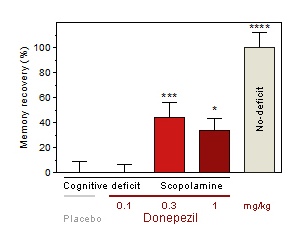
Donepezil
Passive avoidance Reversal effect of Donepezil on memory deficit induced by scopolamine in the rat. Memory was assessed by the ability of rats to avoid a punishing or aversive stimuli during the passive avoidance test.
-
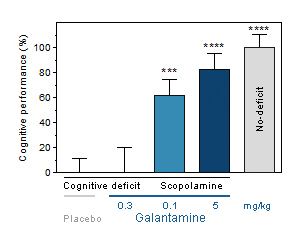
Galantamine
Reversal effect of Galantamine on cognitive deficit induced by scopolamine in the mouse. Cognitive function was assessed by the ability of mice to perform spontaneous, continuous and sustained alternation in the T-maze.
-
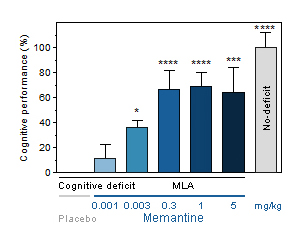
Memantine
Reversal effect of Memantine on cognitive deficit induced by MLA in the mouse. Cognitive function was assessed by the ability of mice to perform spontaneous, continuous and sustained alternation in the T-maze.
-
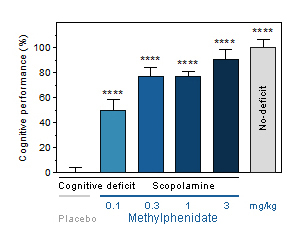
Methylphenidate
Reversal effect of Methylphenidate on cognitive deficit induced by scopolamine in the mouse. Cognitive function was assessed by the ability of mice to perform spontaneous, continuous and sustained alternation in the T-maze.
-
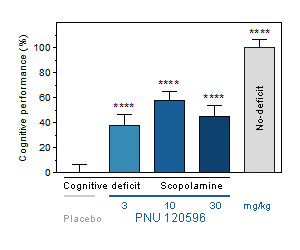
PNU 120596
Reversal effect of PNU120596 on cognitive deficit induced by scopolamine in the mouse. Cognitive function was assessed by the ability of mice to perform spontaneous, continuous and sustained alternation in the T-maze.
-
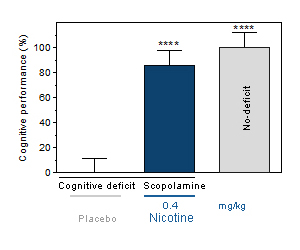
Nicotine
Reversal effect of Nicotine on cognitive deficit induced by scopolamine in the mouse. Cognitive function was assessed by the ability of mice to perform spontaneous, continuous and sustained alternation in the T-maze.
-

Nicotine
Passive avoidance Reversal effect of Nicotine on memory deficit induced by scopolamine in the rat. Memory was assessed by the ability of rats to avoid a punishing or aversive stimuli during the passive avoidance test.
-
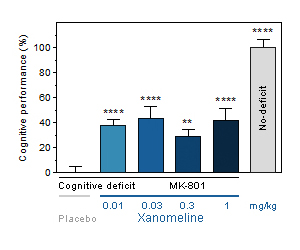
Xanomeline
Reversal effect of Xanomeline on cognitive deficit induced by MK-801 in the mouse. Cognitive function was assessed by the ability of mice to perform spontaneous, continuous and sustained alternation in the T-maze.
-
If you are interested in further information, please do not hesitate to contact us. We would be more than happy to discuss with you about your projects and the services we can propose following your needs.
Get in touch


 PREVIOUS
PREVIOUS